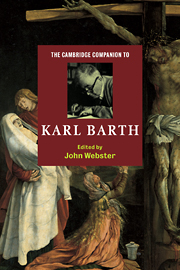Book contents
- Frontmatter
- 1 Introducing Barth
- 2 Theology
- 3 Revelation
- 4 The Bible
- 5 The Trinity
- 6 Grace and being
- 7 Creation and providence
- 8 Karl Barth’s Christology
- 9 Salvation
- 10 The humanity of the human person in Karl Barth’s anthropology
- 11 The mediator of communion
- 12 Christian community, baptism, and Lord’s Supper
- 13 Barth’s trinitarian ethic
- 14 Karl Barth and politics
- 15 Religion and the religions
- 16 Barth and feminism
- 17 Barth, modernity, and postmodernity
- 18 Karl Barth
- Index
10 - The humanity of the human person in Karl Barth’s anthropology
Published online by Cambridge University Press: 28 May 2006
- Frontmatter
- 1 Introducing Barth
- 2 Theology
- 3 Revelation
- 4 The Bible
- 5 The Trinity
- 6 Grace and being
- 7 Creation and providence
- 8 Karl Barth’s Christology
- 9 Salvation
- 10 The humanity of the human person in Karl Barth’s anthropology
- 11 The mediator of communion
- 12 Christian community, baptism, and Lord’s Supper
- 13 Barth’s trinitarian ethic
- 14 Karl Barth and politics
- 15 Religion and the religions
- 16 Barth and feminism
- 17 Barth, modernity, and postmodernity
- 18 Karl Barth
- Index
Summary
ANTHROPOLOGY AS THE DOCTRINE OF THE ‘REAL MAN’
'The ontological determination of humanity is grounded in the fact that one man among all others is the man Jesus' (CD III/2, p. 132). Within the framework of a general human effort at understanding humanity, this principle of Karl Barth's theological anthropology is at first glance very provocative. For Barth, in fact, means that if we want to know who and what the human being is, we are not in the first place to look to ourselves. Nor are we to begin with what the empirical sciences say about the human being; nor are we to orient ourselves to the phenomena of human existence past and present in an attempt to interpret the experiences which are there expressed. All this, according to Barth, can and must be thoroughly considered, acknowledged, and brought to light. It is, however, unsuited for establishing theologically what it is that constitutes the essential character of the human. We are not to learn who and what the human is by observing human beings and their history in general, but rather to do so in the concrete human person to whom, according to Christian faith, God bound himself and entered into human history.
This principle of theological anthropology is particularly provocative today because it does not at first appear to show how it can be connected with what we already know generally about the human being. And without such a connection, all statements of theological anthropology are in danger of hanging isolated in space, simply incomprehensible outside of theological discourse. If this were to be the case then in the opinion of many, theological anthropology would gamble away a significant opportunity with which it is faced in a time shaped by secularism and atheism. This is the opportunity of being able to explain, even in our time, that precisely when human existence is at issue at least the question of God is unavoidable.
- Type
- Chapter
- Information
- The Cambridge Companion to Karl Barth , pp. 159 - 176Publisher: Cambridge University PressPrint publication year: 2000
- 5
- Cited by

